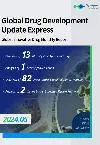Agios Aces Phase III Study in Adults with Alpha- or Beta-Thalassemia
03 Jan 2024
Phase 3Clinical ResultDrug Approval
Pictured: Screenshot of Agios Pharmaceuticals' website, Pavel Kapysh/Shutterstock
Rare disease company Agios Pharmaceuticals reached the primary endpoint in a Phase III study for its drug pyrukynd (mitapivat) in adults with non-transfusion-dependent alpha- or beta-thalassemia, according to the company’s announcement on Wednesday
The Phase III ENERGIZE study met the primary endpoint of hemoglobin response, defined as an increase equal to or greater than 1g/dl in average hemoglobin concentrations from week 12 through week 24. Treatment with the drug showed a statistically significant rise against a placebo, with 42.3% of patients in the mitapivat group having a response compared to 1.6% of patients in the placebo group. This earned a p-value of p<0.0001.
For the secondary endpoints, the Phase III trial showed a change from the baseline in the average functional assessment of chronic illness therapy-fatigue subscale score and a change from the baseline in the average hemoglobin concentration. However, hard numbers for these metrics were not made available.
The late-stage study results boosted the company’s stock price, which was up over 9% Wednesday morning.
“The results of the Phase III ENERGIZE study underscore the potential of mitapivat to be a meaningful treatment option for adults with non-transfusion dependent alpha- or beta-thalassemia. All subgroup analyses favored the mitapivat treatment arm compared to placebo,” Agios CMO Sarah Gheuens said in a statement.
Gheuens said that the data is bringing the biotech “one step closer” to treatment for all thalassemia patients and is planning a readout of its ENERGIZE-T trial for thalassemia patients who regularly receive transfusions sometime in the middle of 2024. Following the readout of the study, Agios will then apply for regulatory approval of mitapivat as a thalassemia treatment by the end of the year.
“For NTD thalassemia patients across the globe, there are currently no approved oral treatments, and NTD thalassemia has consistently been associated with morbidity and mortality if left untreated. NTD thalassemia represents over half of clinically significant forms of thalassemia, so there is a tremendous unmet need,” Ali Taher, director of the Naef K. Basile Cancer InstituteCancer Institute at the American University of Beirut Medical Center in Lebanon, said in a statement.
The drug was approved by the FDA in February 2022 to treat hemolytic anemia in adults with a pyruvate kinase deficiency. It has also been a primary seller for the company, pulling in $7.4 million for the third quarter of 2023.
Tyler Patchen is a staff writer at BioSpace. You can reach him at tyler.patchen@biospace.com. Follow him on LinkedIn.
For more details,please visit the original website
The content of the article does not represent any opinions of Synapse and its affiliated companies. If there is any copyright infringement or error, please contact us, and we will deal with it within 24 hours.
Organizations
Indications
Targets
-Drugs
Chat with Hiro
Hot reports
Get started for free today!
Accelerate Strategic R&D decision making with Synapse, PatSnap’s AI-powered Connected Innovation Intelligence Platform Built for Life Sciences Professionals.
Start your data trial now!
Synapse data is also accessible to external entities via APIs or data packages. Leverages most recent intelligence information, enabling fullest potential.



